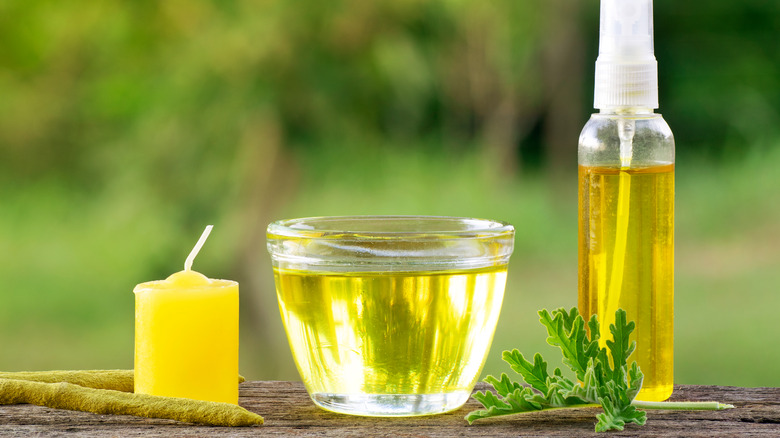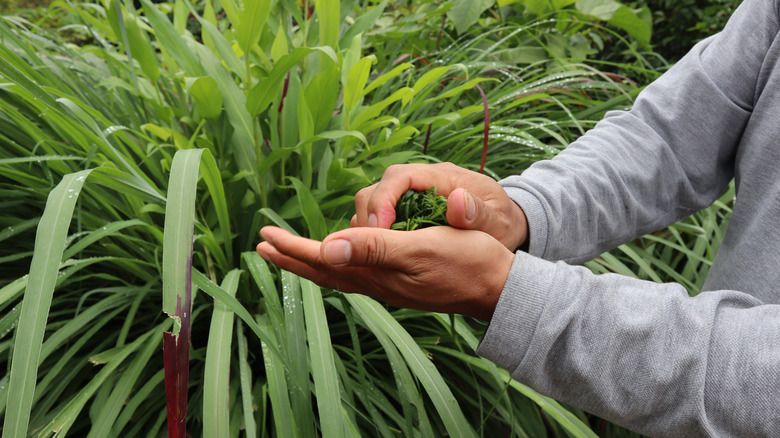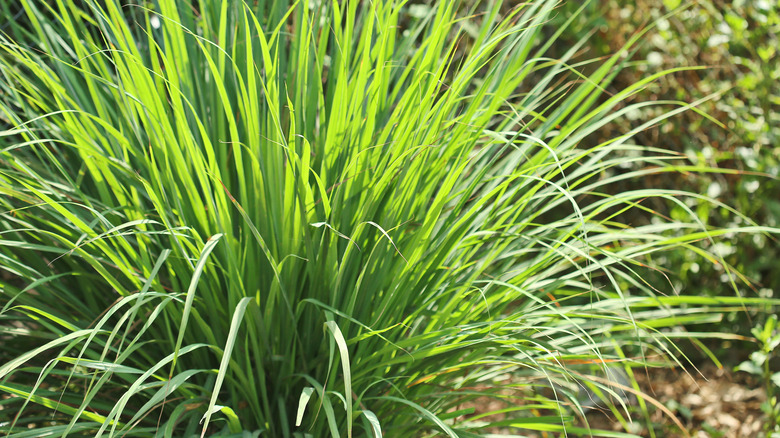What Is Citronella And How Do You Use It?
With its delicate notes of citrus and floral, along with a light fresh scent, citronella (Cymbopogon nardus or Cymbopogon winterianus) — a tropical grass native to southeast Asia — is used in all types of products from perfume to medicine to food flavoring. However, it is best known as an insect repellant, according to the Centre for Agriculture and Bioscience International. Greek and Roman writings indicate that plants like citronella were used to keep bugs away, and today people still use candles, oils, and other products infused with citronella oil to repel mosquitoes, per a 2011 article in Malaria Journal by Marta Ferreira Maia and Sarah J. Moore.
Citronella grass is usually distilled by steam to create an oil that is then used in food and other products, reported WebMD. You can use diluted citronella oil on skin to ward off mosquitos, although many believe using it as a preventive measure provides only short-term (if any) effects. Used in small amounts, citronella is deemed safe by the Food and Drug Administration, said the National Pesticide Information Center. Those with sensitive skin might experience some irritation, and can opt for a slew of other citronella products to deter bug bites, such as candles and Tiki torches. Want to know if citronella is right for you? Read on.
What is citronella?
Citronella is a grass located in a variety of tropical places, from Africa, Asia, and South America to the Pacific, according to the Centre for Agriculture and Bioscience International. In the United States, it grows as a perennial in USDA Zones 10 through 12. Additionally, citronella can be used in many things; those wanting to repel insects infuse it into candles, oils, and incense. Citronella is also made into medicinal products, such as stimulants to be inhaled or applied on the body, or used as an antiseptic. In the Chinese culture, the substance is even considered helpful in treating rheumatism, digestive disorders, and fever, and is also used in aromatherapy to treat colds, flu, and headaches.
This grass, either Cymbopogon nardus or Cymbopogon winterianus, grows in clumps and can achieve heights of 5 to 6 feet and expands up to 3 or 4 feet wide, according to Gardening Know How. Sometimes lemon-scented geraniums are confused with citronella and are planted near a patio or porch to prevent mosquito bites. This won't work since those plants don't contain the citronella oils that repel the bugs. But putting citronella plants nearby won't necessarily chase the mosquitos away either; for the oil to work, it must undergo an extraction process — this can be as simple as crushing the citronella grass directly on your skin or actually harvesting and distilling it.
How to use citronella
Citronella oil reportedly has many benefits. In places such as China and Indonesia, the ingredient has been used to treat all sorts of health problems such as rashes and infections for centuries, according to Healthline. The substance flavors food and enriches perfumes ... and, of course, is used as an insect repellent. In Brazil, the grass provides a key ingredient for purification and banishing ceremonies, and smoking an area with its citrus-floral fragrance is part of many rituals, reported Fragrantica. It is also put into a tea that allegedly aids the nervous system.
While many use citronella oil as a mosquito deterrent, WebMD points out that its effectiveness diminishes over time, and typically diluted varieties (with 5% or 10% potency) last for less than 20 minutes. Versions with concentrations of 100% citronella stay potent longer, but aren't as long-lasting as repellents with DEET. So those that use this plant-based repellent may need to reapply it throughout their time outdoors.
Bugs might not like the smell of citronella, but humans do. That's why you'll find it in perfumes, potpourris, cleaning products (it also has anti-fungal properties), and as a flavor enhancer in food, per Now. The substance is approved by the U.S. Food and Drug Administration.
How citronella works
Insects like certain scents, and citronella oil masks these smells so bugs like mosquitos cannot find you, according to Tropical Medicine & International Health. However, this ingredient cannot kill the insects nor can the plant itself prevent mosquitos from biting you. In fact, only the extracted plant oil can hide the delicious carbon dioxide and lactic acid smells that attracts bugs, said Insect Cop. The CO2 released in human or animal breath provides a trail for the mosquito, which helps them find your general position. Then the mosquitos look for their victim's warmth before attacking, reported the Good News Network. Repellants work because the scent masks smells mosquitos prefer.
That same oil is also used in a variety of products for medicinal purposes, flavoring, and fungicide, said Healthline. Studies show that citronella oil can kill fungus by breaking down its cell walls. It also helps wounds heal because of its antifungal and anti-inflammatory properties. To use citronella oil, you can disperse it with a spray bottle — applying the substance on yourself or infusing it into a room — or a diffuser. You can also put it on as a topical oil, lotion, or cream. Citronella bracelets, candles, torches, and more also are available to keep insects away.
Pros and cons of citronella
The biggest con with citronella is that evidence is inconclusive on whether or not it truly keeps those pesky mosquitos away, according to Malaria Journal. Additionally, because the oil evaporates quickly, it can lose its potency within two hours. Mixing citronella with other substances such as vanillin (found in vanilla beans) can increase protection time, though. Candles seem to retain citronella oil longer — although, as Eric Hoffer, president of Hoffer Pest, said to Today, "in most cases, a citronella candle is going to contain a 5% concentration of citronella or less." The outlet also pointed out that the U.S. Center for Disease Control and Prevention does not list citronella as a recommended repellent for mosquitos.
On the pro side, is citronella is natural and has been embraced for a long time for its variety of uses, according to Gardening Know How. Its insect repellent properties became known in 1901 when it was used in salon items as a fragrance. Prior to that, citronella found its way into medicines and rituals for hundreds of years. Most people can enjoy citronella products, too, since the oil has few side effects, such as minor skin irritations (via E Medicine Health).
Is citronella safe?
Citronella is on the U.S. Environmental Protection Agency's minimum risk pesticide list. That means that the ingredient is basically non-toxic to humans, pets, and wildlife. The ingredient, after all, merely repels bugs; it doesn't kill them. However, citronella can bother sensitive skin and trigger allergies, especially with prolonged or regular exposure, according to the National Pesticide Information Center. Citronella can also cause coughing or throat irritation if swallowed, so be careful if you are using a product like a torch and are breathing the vapors for a long period. You'll also want to wash your hands before eating if you've applied a solution with the ingredient in it. In general, citronellol, citronellal, and geraniol make up citronella oil — and the body can safely break down all of these materials if accidentally ingested.
Young children, who often experience sensitivities after pesticide exposure, should be careful with citronella, too. Those under six months old should avoid using any unless advised to do so by a doctor. Keep in mind that kids frequently put fingers in their mouths so an adult should rub the repellent product on them to maintain more control. During the application, avoid their hands, mouth, and eye areas. The National Pesticide Information Center suggests always reading the product label before using anything that contains citronella, and to follow the first aid directions, if needed. You can also call the Poison Control Center at 1-800-222-1222.





